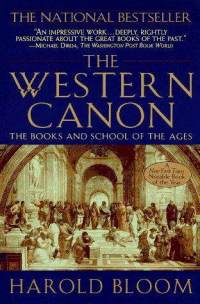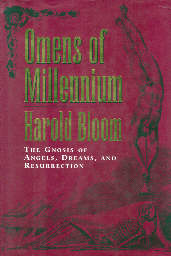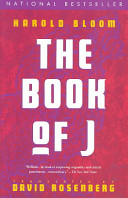The Western Canon
by Harold Bloom
Review By Dan Geddes
11 February 2001
See also reviews of Bloom’s The Book of J, The Anxiety of Influence, and Omens of Millenium.
Harold Bloom’s The Western Canon reads like a work a desperation; a work from a man convinced that imaginative literature as he knows it is dying, only to be replaced by literature of alienation. Whether or not this fear is grounded can only be known in the future, but as a reader of Bloom it is always refreshing to be in the presence of a writer who is enthusiastic about literature, and has a solid command of his material.
Forming bookends around his incisive critiques of twenty-six representative canonical authors, Bloom engages in a polemic against what he terms the School of Resentment. This school is composed of Feminists, Historicists, Deconstructionists, and Afrocentrists, among others, all of who wish to widen the canon so as to include works of the oppressed: blacks, Hispanics, and women. The School of Resentment views the traditional canon politically, as a means the social elite drives home the inferiority of subject classes. Hence the greater Western writers–Shakespeare, Dante, Cervantes, Goethe, Joyce, Kafka, et. al–are, for the School of Resentment, merely dead white European males, products of the “social energies” of their time. Since most of their works seem politically incorrect to modern sensibilities, containing as they do strong elements of chauvinism, elitism, archaic political views, anti-Semitism, etc., the School of Resentment opposes them for their political and moral content: when read, the literary giants perpetuate social ills.
This brief summary does not begin to cover the multifaceted complaints against the canon made by the School of Resentment, whose various agendas, given ample time to fester in lifelong university careers, attack the canon on a variety of grounds. For Bloom, the cardinal error of the School, is that it fails to appreciate the sheer aesthetic power of canonical writers. Bloom sees the canonical writers as operating from largely aesthetic motives, so that the supposed political or moral content of their works is tertiary, and only weakens the works when it appears. Whereas the School may see all writing as a political action, Bloom views literature as a largely solitary endeavor, a way we find the self-within. The canon survives because of its aesthetic power, and despite any tendentiousness on the part of the creative artist.
Literature faces other enemies besides the School of Resentment, chiefly competing media and declining attention spans among citizens, and even the remaining readers. Canonical works demand great cognitive and imaginary effort on the part of the reader, and usually require rereading. The works favored by the School of Resentment are usually thinner and more disposable, and simply cannot be reread. But Blooms claims to be indifferent to the implications of this, believing that those who read for aesthetic enjoyment alone will always be around, and the rest, many of whom will be snatched up culture studies, can be left to their fate.
Although Bloom’s polemic against the School of Resentment continues throughout the body of his work–the critique of 26 giants of world literature–here he pursues other theses, some of which are familiar to readers of Bloom’s other works.
Bloom’s cardinal critical thesis is the “anxiety of influence,” to which he devoted an entire 1973 work by that name, but which also Bloom defends (or invokes) in his later writings. The anxiety of influence sees each new potential writer as largely an ephebe, who has digested a great deal of canonical works even before he has begun to write, but who must struggle to overcome these influences, lest his own originality be strangled stillborn. But even the creative genius will bear strong traces of influence from the past genius, which he or she will try to mask through various methods: claiming other influences, blending influences, attacking and disowning the influence, etc. Few go as far as Beckett, who presumably began writing in French to avoid the influence of Joyce’s style.
Thus, literature becomes “an achieved anxiety,” and for Bloom, a writer’s dialogue with his literary forbears is far more crucial than the “social energies” of his own time. Influences flow intertextually, and so for great writers, the big issues are personal immortality through grappling with the masters, and one’s own literary immortality rather than the social causes of one’s day, which are as ephemeral as shadows in The Cave.
And for Western writers, the principal anxiety of influence comes from Shakespeare, who, as Bloom likes to repeat, is the canon. The scope of Shakespeare’s world contains everything that is to follow. No writer can match Shakespeare’s virtuosity of language and cognitive power. Shakespeare invented us, according to Bloom, because he began character representation as we know it. And aside from all of his literary prowess, Shakespeare’s inauguration of having characters overhear themselves think–depicting character ambivalence and character change–has become the touchstone of all subsequent literature. In Shakespeare we can find precursors for nearly all of literature’s most memorable characters.
Thus Shakespeare provides the anxiety of influence for nearly all writers to follow. And in his essays on various canonical writers, Bloom lists the writer’s various influences, and the means by which he or she dealt with their influence anxiety.
Bloom’s Western Canon undoubtedly has drawn fierce flak from other academics, whose suspicions that Bloom is a Euro-centric reactionary receive ample confirmation in this work. But the forces of multiculturalism are so strong that Bloom’s elegy for the Western canon is unthreatening. Despite its packaging, the book is really only a set of essays on works central to Bloom’s understanding of Western literature. As such, the essays must stand on their own merit, rather than on the provocative packaging in which they are wrapped.
11 February 2001
See also reviews of Bloom’s Book of J, Anxiety of Influence, and Omens of Millenium.]










[…] the old canon and made their own. You can guess why the literary critic Harold Bloom called them “the School of Resentment.” I should not criticize them too harshly; literary standards in recent decades have greatly […]
Hi C.E. Hammock, Thanks for the links to two of my articles on Harold Bloom’s books. Best! Dan Geddes